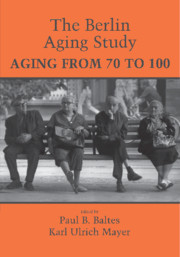Book contents
- Frontmatter
- Contents
- Acknowledgments
- Introduction
- Part A Theoretical Orientations and Methods
- Part B Major Results from the Four Research Units
- Part C Interdisciplinary Findings
- 9 Men and Women in the Berlin Aging Study
- 10 Social Relationships in Old Age
- 11 Self, Personality, and Life Regulation: Facets of Psychological Resilience in Old Age
- 12 Limits and Potentials of Intellectual Functioning in Old Age
- 13 Sensory Systems in Old Age
- 14 Everyday Competence in Old and Very Old Age: Theoretical Considerations and Empirical Findings
- 15 On the Significance of Morbidity and Disability in Old Age
- 16 The Utilization of Medical and Nursing Care in Old Age
- 17 Sources of Well-Being in Very Old Age
- Part D Overview and Outlook
- Notes on Contributors
- Abbreviations
- Author Index
- Subject Index
13 - Sensory Systems in Old Age
Published online by Cambridge University Press: 06 December 2010
- Frontmatter
- Contents
- Acknowledgments
- Introduction
- Part A Theoretical Orientations and Methods
- Part B Major Results from the Four Research Units
- Part C Interdisciplinary Findings
- 9 Men and Women in the Berlin Aging Study
- 10 Social Relationships in Old Age
- 11 Self, Personality, and Life Regulation: Facets of Psychological Resilience in Old Age
- 12 Limits and Potentials of Intellectual Functioning in Old Age
- 13 Sensory Systems in Old Age
- 14 Everyday Competence in Old and Very Old Age: Theoretical Considerations and Empirical Findings
- 15 On the Significance of Morbidity and Disability in Old Age
- 16 The Utilization of Medical and Nursing Care in Old Age
- 17 Sources of Well-Being in Very Old Age
- Part D Overview and Outlook
- Notes on Contributors
- Abbreviations
- Author Index
- Subject Index
Summary
In this chapter, three sensory systems (hearing, vision, and balance/gait) are examined. We begin with a descriptive overview of individual differences and age difference patterns in sensory functioning. The pattern of how individual differences in sensory acuity might be related to performance in other psychological and behavioral domains is examined. We reveal a strong, negative pattern of age differences in all three senses studied. These negative age trends have implications for the classification of sensory impairment rates: Although participants in their 70s have levels of sensory acuity that might be classified, on average, as slightly or mildly impaired, by their 90s most participants evince levels that might be classified as moderately to severely impaired, not only in one but in multiple modalities. We also report prevalence rates for the use of commonly occurring compensatory devices and procedures (e.g., hearing aids, glasses, cataract operations). We report the following findings with regard to the relationship of sensory functioning to other domains of psychological and behavioral performance (e.g., intellectual functioning, basic and expanded everyday competence, personality characteristics, well-being, social network size):
(1) Relationships exist between all three sensory domains and the selected outcome domains. The relationships with intellectual functioning and everyday competence are particularly strong.
(2) In all domains studied, the sensory variables can explain or mediate virtually all of the age-related variance in those domains; that is, after statistically controlling for sensory performance, there is essentially no unique effect of chronological age.
[…]
- Type
- Chapter
- Information
- The Berlin Aging StudyAging from 70 to 100, pp. 360 - 383Publisher: Cambridge University PressPrint publication year: 1998
- 1
- Cited by

